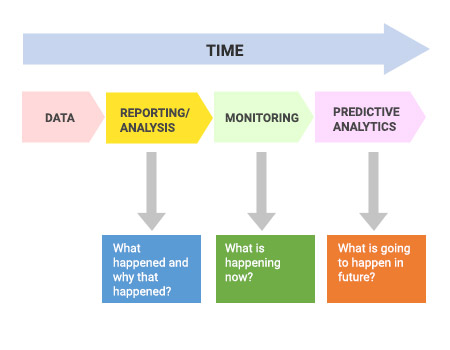Technology and advancements in medical science have greatly improved the provision of healthcare. But there still remains a lot of room for innovation in predicting health hazards and prevention of ailments before they happen. As it has been said, "Prevention is better than cure." Addiction to narcotic drugs such as dissociatives and opioids can be extremely fatal and interfere with the ability to heal.
Drug Abuse is becoming, or perhaps has already become, an epidemic in the United States. A recent statistic release by the Surgeon General has stated that an estimated 2.1 million people in the U.S. struggle with opioid use disorder. Rates of opioid overdose deaths are rapidly increasing. This frightening trend can be halted if patients prone to drug abuse can be identified in advance and the appropriate corrective measures can be taken.
How will it be done?
Artificial Intelligence (AI) assists in identifying potential drug-dependent individuals and by reducing instances of addiction. It protects several patients from danger and reduces additional expenditure on medicine. The operation of AI in predictive healthcare can be illustrated in these steps:
- Big Data: Intranet applications and Electronic Health Records (EHR) have completely digitized the functioning of healthcare organizations. Records of every patient visiting a hospital are stored digitally and can be accessed anytime. These pieces of data are crucial as they showcase the medical history of a patient as well as his/her reaction to various medical aids. Collecting the big data of patient records will be the first step in integrating Artificial Intelligence into healthcare.
Big data indexing techniques and some of the new work being done to find information in textual fields, could indeed add real value to healthcare analytics in the future. There is an immense need for infusing Big Data Analytics with healthcare, as healthcare is one of the largest and most complex industries in the United States. Big Data can provide healthcare institutions with some instant advantages such as:
- Prevention of Medication Errors: Medication errors are serious issues that need to be handled in healthcare organizations. Big data reduces these errors by analyzing the patient's records with all medications prescribed, and notifying practitioners of anything that seems out of place.
- Reducing Hospital Expenditure:There is enormous potential for cutting costs with big data in healthcare.The ability to capture and analyze physician data optimizes patient outcomes while reducing healthcare costs.

- Predictive Analytics: The relation between a patient's age, gender and lifestyle will be associated with his or her healthcare issues. Similar patterns between different people or different groups will be identified and documented. Medical practitioners and analysts can even use these pieces of data for assistance in medical research. The advantages of such predictive analytics are as follows
- Increase the accuracy of diagnoses: This can be illustrated with a scenario. A patient comes to a doctor for the occurrence of chest pain. It will need to be assessed whether or not the patient needs to be immediately hospitalized. The chest pain could be related to an array of issues depending on the state of health the patient has. Prior information on the patient can assist in analysing his or health condition and provide an accurate diagnosis.
- Prevent the outbreak of diseases beforehand: Several diseases and regular ailments can be prevented with early intervention. A patient may display symptoms that can lead to a serious ailment. Such signs can indicate an emergency situation and preventive healthcare can be implemented to avoid the worsening of the situation.

Using Artificial Intelligence
After collecting big data and conducting a predictive analysis, software applications operated on Artificial Intelligence will be utilized to complete the process. The utilization of AI in healthcare can go beyond identifying existing health problems as it can even predict emerging ones. The analysis of a wide variety of data inputs and machine-learning algorithms can help detect potential health issues before a person notices the first symptoms. Some of the most popular methods that AI can be utilized in the healthcare industry are:
- Health Monitoring: Wearable health trackers can monitor heart rates and activity levels. They can send alerts to the user on different statistics and the same information can be shared with doctors for data on the habits of patients.
- Virtual Nursing Assistants: It refers to a pre-programmed avatar that will answer all queries related to medicine. The San Francisco based virtual nurse assistant named "Molly" and Care Angel's virtual assistant named "Angel" are good examples of this.
- Image Analysis: A machine learning algorithm can analyze 3D scans up to 1,000 times faster than what can be done today. This real-time assessment can provide critical input for surgeons who are operating.
- Management of Medical Records: Data management is the most widely used application of Artificial Intelligence and digital automation. Robots collect, store, re-format, and trace data to provide faster, more consistent access.
CONCLUSION
There are several more advantages that Artificial Intelligence can provide to the healthcare industry. It will depend on specified requirements of healthcare organizations or medical practitioners and researches. Contact SGS Technologie and we will give you original, intelligent solutions.

<script type="application/ld+json">
{
"@context" : "http://schema.org",
"@type" : "Article",
"name" : "Improving Predictive Healthcare with Artificial Intelligence",
"author" : {
"@type" : "Person",
"name" : "majestic"
},
"image" : "https://www.sgstechnologies.net/sites/default/files/2020-01/doc.jpg",
"articleSection" : "Technology and advancements in medical science have greatly improved the provision of healthcare. But there still remains a lot of room for innovation in predicting health hazards and prevention of ailments before they happen. As it has been said, �Prevention is better than cure.� Addiction to narcotic drugs such as dissociatives and opioids can be extremely fatal and interfere with the ability to heal.",
"articleBody" : "Drug Abuse is becoming, or perhaps has already become, an epidemic in the United States. A recent statistic release by the <A href=\"https://www.hhs.gov/about/news/2018/04/05/surgeon-general-releases-advisory-on-naloxone-an-opioid-overdose-reversing-drug.html\"><U>Surgeon General</U></A> has stated that an estimated 2.1 million people in the U.S. struggle with opioid use disorder. Rates of opioid overdose deaths are rapidly increasing. This frightening trend can be halted if patients prone to drug abuse can be identified in advance and the appropriate corrective measures can be taken.</P>\n\n<P><STRONG>How will it be done?</STRONG></P>\n\n<P>Artificial Intelligence (AI) assists in identifying potential drug-dependent individuals and by reducing instances of addiction. It protects several patients from danger and reduces additional expenditure on medicine. The operation of AI in predictive healthcare can be illustrated in these steps:</P>\n\n<UL>\n\t<LI><STRONG>Big Data:</STRONG> Intranet applications and Electronic Health Records (EHR) have completely digitized the functioning of healthcare organizations. Records of every patient visiting a hospital are stored digitally and can be accessed anytime. These pieces of data are crucial as they showcase the medical history of a patient as well as his/her reaction to various medical aids. Collecting the big data of patient records will be the first step in integrating Artificial Intelligence into healthcare.</LI>\n</UL>\n\n<P>Big data indexing techniques and some of the new work being done to find information in textual fields, could indeed add real value to healthcare analytics in the future. There is an immense need for infusing Big Data Analytics with healthcare, as healthcare is one of the largest and most complex industries in the United States. Big Data can provide healthcare institutions with some instant advantages such as:</P>\n\n<UL>\n\t<LI><STRONG>Prevention of Medication Errors:</STRONG> Medication errors are serious issues that need to be handled in healthcare organizations. Big data reduces these errors by analyzing the patient�s records with all medications prescribed, and notifying practitioners of anything that seems out of place.</LI>\n\t<LI><STRONG>Reducing Hospital Expenditure:</STRONG>There is enormous potential for cutting costs with big data in healthcare.The ability to capture and analyze physician data optimizes patient outcomes while reducing healthcare costs. </LI>\n</UL>\n\n<P> </P>\n\n<P><IMG src=\"/core/themes/sgs/images/improve1.jpg\"/></P>\n\n<P> </P>\n\n<UL>\n\t<LI><STRONG>Predictive Analytics: </STRONG>The relation between a patient�s age, gender and lifestyle will be associated with his or her healthcare issues. Similar patterns between different people or different groups will be identified and documented. Medical practitioners and analysts can even use these pieces of data for assistance in medical research. The advantages of such predictive analytics are as follows\n\n\t<UL>\n\t\t<LI><STRONG>Increase the accuracy of diagnoses:</STRONG> This can be illustrated with a scenario. A patient comes to a doctor for the occurrence of chest pain. It will need to be assessed whether or not the patient needs to be immediately hospitalized. The chest pain could be related to an array of issues depending on the state of health the patient has. Prior information on the patient can assist in analysing his or health condition and provide an accurate diagnosis.</LI>\n\t\t<LI><STRONG>Prevent the outbreak of diseases beforehand</STRONG>: Several diseases and regular ailments can be prevented with early intervention. A patient may display symptoms that can lead to a serious ailment. Such signs can indicate an emergency situation and preventive healthcare can be implemented to avoid the worsening of the situation.</LI>\n\t</UL>\n\t</LI>\n</UL>\n\n<P><IMG src=\"/core/themes/sgs/images/improve2.jpg\"/></P>\n\n<P><STRONG>Using Artificial Intelligence</STRONG></P>\n\n<P>After collecting big data and conducting a predictive analysis, software applications operated on Artificial Intelligence will be utilized to complete the process. The utilization of AI in healthcare can go beyond identifying existing health problems as it can even predict emerging ones. The analysis of a wide variety of data inputs and machine-learning algorithms can help detect potential health issues before a person notices the first symptoms. Some of the most popular methods that AI can be utilized in the healthcare industry are:</P>\n\n<UL>\n\t<LI><STRONG>Health Monitoring</STRONG>: Wearable health trackers can monitor heart rates and activity levels. They can send alerts to the user on different statistics and the same information can be shared with doctors for data on the habits of patients. </LI>\n\t<LI><STRONG>Virtual Nursing Assistants: </STRONG>It refers to a pre-programmed avatar that will answer all queries related to medicine. The San Francisco based virtual nurse assistant named �<A href=\"http://www.sensely.com/\"><U>Molly</U></A>� and Care Angel�s virtual assistant named �<A href=\"https://www.careangel.com/\"><U>Angel</U></A>� are good examples of this.</LI>\n\t<LI><STRONG>Image Analysis: </STRONG>A machine learning algorithm can analyze 3D scans up to 1,000 times faster than what can be done today. This real-time assessment can provide critical input for surgeons who are operating. </LI>\n\t<LI><STRONG>Management of Medical Records: </STRONG>Data management is the most widely used application of Artificial Intelligence and digital automation. Robots collect, store, re-format, and trace data to provide faster, more consistent access.</LI>\n</UL>\n\n<P><STRONG>CONCLUSION</STRONG></P>\n\n<P>There are several more advantages that Artificial Intelligence can provide to the healthcare industry. It will depend on specified requirements of healthcare organizations or medical practitioners and researches. <A href=\"/contact\"><U>Contact SGS Technologie</U></A> and we will give you original, intelligent solutions.",
"url" : "https://www.sgstechnologies.net/blog/improving-predictive-healthcare-artificial-intelligence",
"publisher" : {
"@type" : "Organization",
"name" : "sgs"
}
}
</script>










